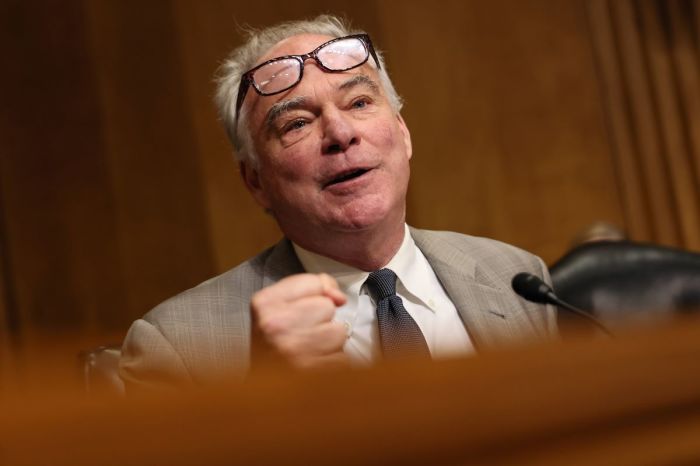
Sen. Tim Kaine, D-Va., has doubled down on his criticism of the idea that people’s rights come from God and not the government, as his recent remarks during a U.S. Senate hearing have drawn backlash from religious and political leaders.
Kaine, a Catholic who was the Democratic vice presidential nominee in 2016, wrote an op-ed for Fox News published on Tuesday, responding to another Fox News op-ed written by Bishop Robert Barron of the Roman Catholic Diocese of Winona-Rochester two days earlier.
During a Senate Foreign Relations Committee hearing last week, Kaine characterized the idea that rights come from God as “extremely troubling.” The senator insisted that such an idea is “what the Iranian government believes,” calling it a “theocratic regime that bases its rule on Sharia law and targets Sunnis, Baha’is, Jews, Christians and other religious minorities” because “they believe that they understand what natural rights are from their Creator.”
Barron wrote that Kaine’s remarks are what’s “truly troubling” and urged readers to “resist this dangerous rhetoric” and celebrate “inalienable rights.”
“And it’s a fruit, I would argue, of the increasing marginalization and privatization of, if not outright hostility toward, organized religion, which is the bedrock of our democracy,” the bishop asserted.
Barron also posted a video on social media a few days earlier, calling Kaine’s comments “dangerous to our democracy.”
In response to Barron’s op-ed, Kaine called the bishop’s views “deeply disturbing.” The senator expressed agreement with the notion of the Founding Fathers that “all people are endowed by the Creator with certain inalienable rights, including life, liberty and the pursuit of happiness.” At the same time, he detailed how his experience working alongside Catholic missionaries in the military dictatorship of Honduras taught him that “rights are essentially meaningless unless they are protected by law.”
Kaine listed the rights to vote, trial by jury, freedom of the press, bear arms, due process, assembly, and not to be subject to cruel and unusual punishments as examples of rights explicitly protected in the U.S. Constitution that are not mentioned in “the Bible or other sacred texts.” He cited the legality of slavery until the passage of the 13th Amendment to the U.S. Constitution as an example of how a natural right to freedom was not protected in the U.S. until slavery became illegal.
“Unless protected by law, everyday people cannot rest secure that their critical rights will be protected. Claiming that all rights come from the Creator and not from laws or government leaves the door wide open for dictators to ignore the law and simply proclaim that they are doing God’s will,” he wrote.
“That has happened throughout history and it’s happening today in many parts of the world. It’s one reason why America cast off the British monarchy 250 years ago — we don’t accept a ‘divine right of kings’ to set, change or destroy the rules.”
Kaine said Barron “should thank God that his rights, and the rights of all Americans, are protected by law.”
“Bishop Barron should thank God that his rights, and the rights of all Americans, are protected by law,” Kaine wrote. “When it comes to the important business of ensuring legal rights, we should all heed the wisdom often attributed to St. Augustine: ‘Pray as though everything depends upon God. Work as though everything depends upon you.'”
The Senate Foreign Relations Committee hearing featured one witness, Riley Barnes, who shared his agreement with Secretary of State Marco Rubio’s belief that “all men are created equal because our rights come from God, our Creator; not from our laws, not from our governments.”
Barnes identified his belief as consistent with the proclamation laid out in the Declaration of Independence, stating that men are “endowed by their Creator with certain unalienable rights.” He also did not dispute the importance of equality under the law, maintaining that “these rights that are inherent in human dignity predate the law.”
Ryan Foley is a reporter for The Christian Post. He can be reached at: ryan.foley@christianpost.com

















